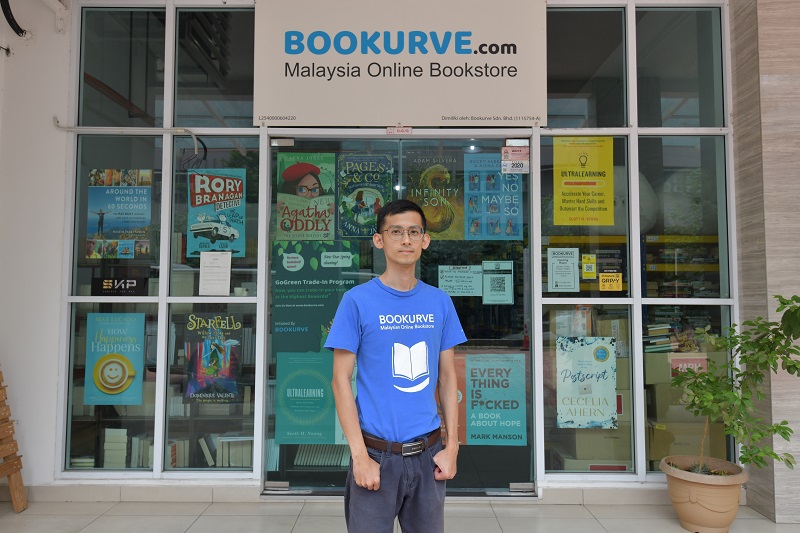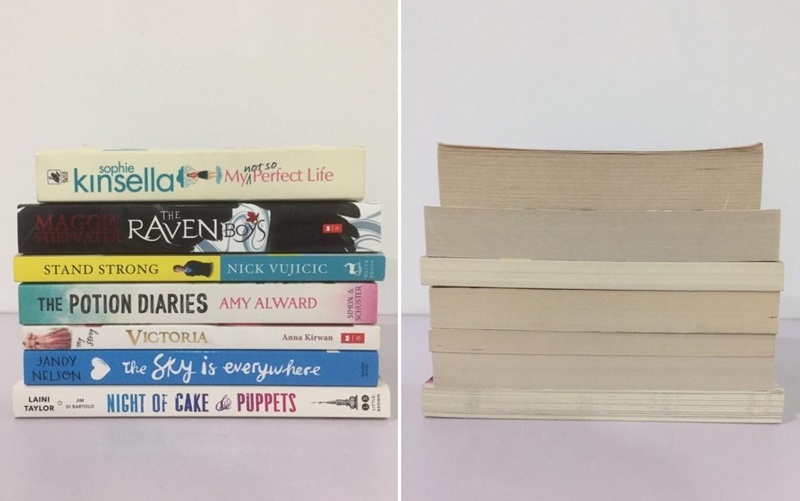
Teoh (Photo: Suhaimi Yusuf/The Edge)
In 2012, the retail scene for books was nothing like it is now, dominated by just a few chain stores and almost all book purchases made at bricks-and-mortar outlets. IT professional and avid reader Teoh Lian Shan, whose full-time job was developing mobile apps for clients, came up with the idea of combining his passion with his profession, inspired by Amazon’s success. He made a few tactical errors — selling specific chapters of school textbooks, for example, didn’t work — before Bookurve was born in 2013 as a marketplace for readers looking to buy and talk about books online.
“Our vision is to deliver knowledge to our readers,” Teoh begins. “When we started out, the plan was to create a platform for readers to get recommendations and then download the ebook of their choice, but the market wasn’t ready then. Physical books were more in demand, so that was what we focused on. We didn’t come from the book industry and we didn’t have a huge bank of titles, so we created a niche — we would supply books that couldn’t be found in traditional bookshops by building relationships with overseas distributors.”
As is the case with all new businesses, Bookurve’s first year was difficult. Marketing efforts resulted in some welcome media attention, which drove sales. There was also the novelty factor of shopping for a book online and having it delivered to you for free in a short period of time. Sites like BookDepository.com may offer free delivery and a wide range of titles, but the wait for the books is often up to a month — interminable, if it’s a book you’re looking forward to devouring.
Bookurve moved along quite successfully for a number of years, during which the industry underwent rapid changes. Independent bookstores were on the rise, local publishers upped their game and the dominant chain stores were no more in power. Teoh and his team also managed to increase the number of titles on the site, including those in Bahasa Malaysia and Chinese.
But the one thing that didn’t change? The value placed on a real-life book you can touch and feel with your hands, whose cover you can admire and which you can lovingly display on your bedside table. “Physical books are still valued. While ebooks have become very popular, I don’t think it’s a case of eating into the market enjoyed by books,” Teoh observes. “But what did change is how people are buying books, and where. We also have a growing community of readers in the country, which is encouraging.”
As part of efforts to build a community, buyers on Bookurve are asked why they chose a particular book. In lieu of reviews, which may seem intimidating — or potentially discourage a purchase entirely — this gets people thinking a little differently about reading, or to approach a particular title from a more positive perspective.
20210406_peo_photos_of_founder_bookurve_teoh_lian_shen_7_sy.jpg

As the business matured, however, Teoh knew he needed to innovate. “When my friends asked me what the difference was between shopping at Bookurve and MPH, for example, I could only say we provided free shipping and had a wide selection. After a while, that was not enough.”
Just prior to the start of the Movement Control Order last year, Bookurve launched a unique trade-in programme, establishing itself as a marketplace for readers to exchange notes and trade books that they no longer wished to keep. Starting this year, readers could also opt to sell their books and be rewarded with cash vouchers and points that they can redeem on Bookurve’s site — this way, books are kept in circulation and traders are encouraged to keep reading.
With the launch of the programme, Bookurve has been reborn, somewhat. “The used-books part of the business is more active than any of us expected; we have so many that we are now moving to a bigger office to accommodate it all,” he says. “Basically, we have three categories of people who give away books — the first are the type who hope to sell it, second are those who support the idea of trading second-hand reads and then there are people who don’t want any money for it at all. The final two categories are the ones who tend to enrol in our trade-in programme.”
bookurve_trade_in.jpg

Outside of used books, non-fiction sold exceptionally well last year, with many top sellers in the cookbook category, says Teoh. Books that received good recommendations also sold well, and signing on with Shopee and Lazada as an additional sales channel made a big difference to Bookurve’s bottom line. When asked if Bookurve is now a successful money-making venture, he pauses before answering.
“I would say yes, we can cover our operational costs. But books are not an easy business to be in,” he says thoughtfully. “We did get help from angel investors, and we are hoping for another round of investment so we can put our five-year road map in place.
“Outside of continuing to sell our used and new books, our plan is to work with local publishers to convert as many local titles as possible into ebooks. I see ebooks as complementary to physical books, and we hope to provide a platform for local publishers to publish their ebooks. This will open up more markets to them and allow local authors to develop a bigger fan base outside of Malaysia.”
Teoh goes back to his vision for Bookurve, which is to deliver knowledge. “Digitisation is the way forward and I believe that one will not replace the other in this industry as they are both necessary for the industry to grow. That was our goal in 2012, and it’s our goal this year — for more people to enjoy reading.”
This article first appeared on Apr 12, 2021 in The Edge Malaysia.


